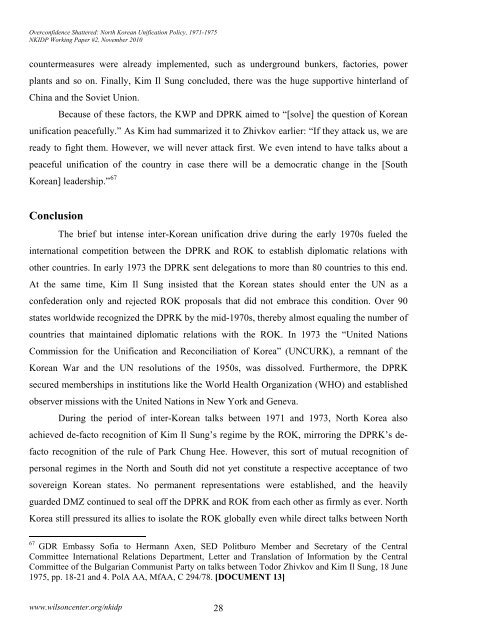Overconfidence Shattered: North Korean Unification Policy, 1971 ...
Overconfidence Shattered: North Korean Unification Policy, 1971 ...
Overconfidence Shattered: North Korean Unification Policy, 1971 ...
- No tags were found...
Create successful ePaper yourself
Turn your PDF publications into a flip-book with our unique Google optimized e-Paper software.
<strong>Overconfidence</strong> <strong>Shattered</strong>: <strong>North</strong> <strong>Korean</strong> <strong>Unification</strong> <strong>Policy</strong>, <strong>1971</strong>-1975NKIDP Working Paper #2, November 2010countermeasures were already implemented, such as underground bunkers, factories, powerplants and so on. Finally, Kim Il Sung concluded, there was the huge supportive hinterland ofChina and the Soviet Union.Because of these factors, the KWP and DPRK aimed to “[solve] the question of <strong>Korean</strong>unification peacefully.” As Kim had summarized it to Zhivkov earlier: “If they attack us, we areready to fight them. However, we will never attack first. We even intend to have talks about apeaceful unification of the country in case there will be a democratic change in the [South<strong>Korean</strong>] leadership.” 67ConclusionThe brief but intense inter-<strong>Korean</strong> unification drive during the early 1970s fueled theinternational competition between the DPRK and ROK to establish diplomatic relations withother countries. In early 1973 the DPRK sent delegations to more than 80 countries to this end.At the same time, Kim Il Sung insisted that the <strong>Korean</strong> states should enter the UN as aconfederation only and rejected ROK proposals that did not embrace this condition. Over 90states worldwide recognized the DPRK by the mid-1970s, thereby almost equaling the number ofcountries that maintained diplomatic relations with the ROK. In 1973 the “United NationsCommission for the <strong>Unification</strong> and Reconciliation of Korea” (UNCURK), a remnant of the<strong>Korean</strong> War and the UN resolutions of the 1950s, was dissolved. Furthermore, the DPRKsecured memberships in institutions like the World Health Organization (WHO) and establishedobserver missions with the United Nations in New York and Geneva.During the period of inter-<strong>Korean</strong> talks between <strong>1971</strong> and 1973, <strong>North</strong> Korea alsoachieved de-facto recognition of Kim Il Sung’s regime by the ROK, mirroring the DPRK’s defactorecognition of the rule of Park Chung Hee. However, this sort of mutual recognition ofpersonal regimes in the <strong>North</strong> and South did not yet constitute a respective acceptance of twosovereign <strong>Korean</strong> states. No permanent representations were established, and the heavilyguarded DMZ continued to seal off the DPRK and ROK from each other as firmly as ever. <strong>North</strong>Korea still pressured its allies to isolate the ROK globally even while direct talks between <strong>North</strong>67 GDR Embassy Sofia to Hermann Axen, SED Politburo Member and Secretary of the CentralCommittee International Relations Department, Letter and Translation of Information by the CentralCommittee of the Bulgarian Communist Party on talks between Todor Zhivkov and Kim Il Sung, 18 June1975, pp. 18-21 and 4. PolA AA, MfAA, C 294/78. [DOCUMENT 13]www.wilsoncenter.org/nkidp 28
















